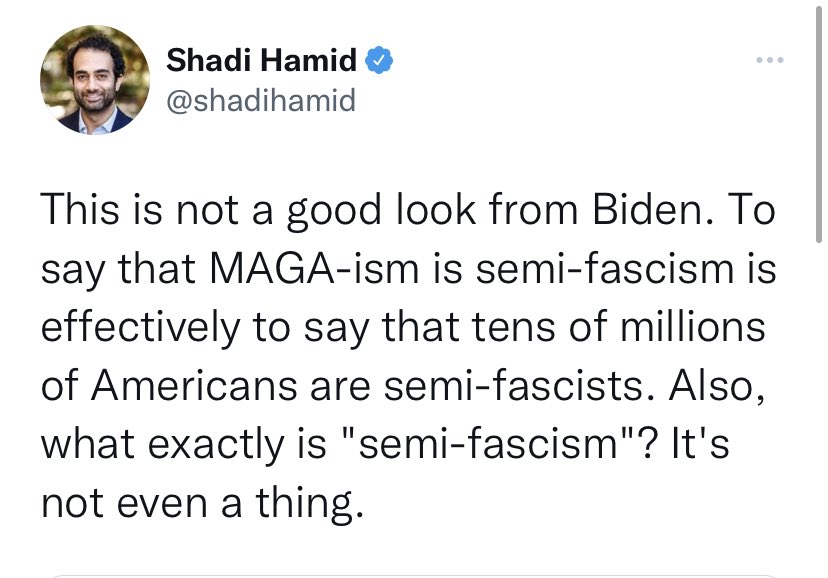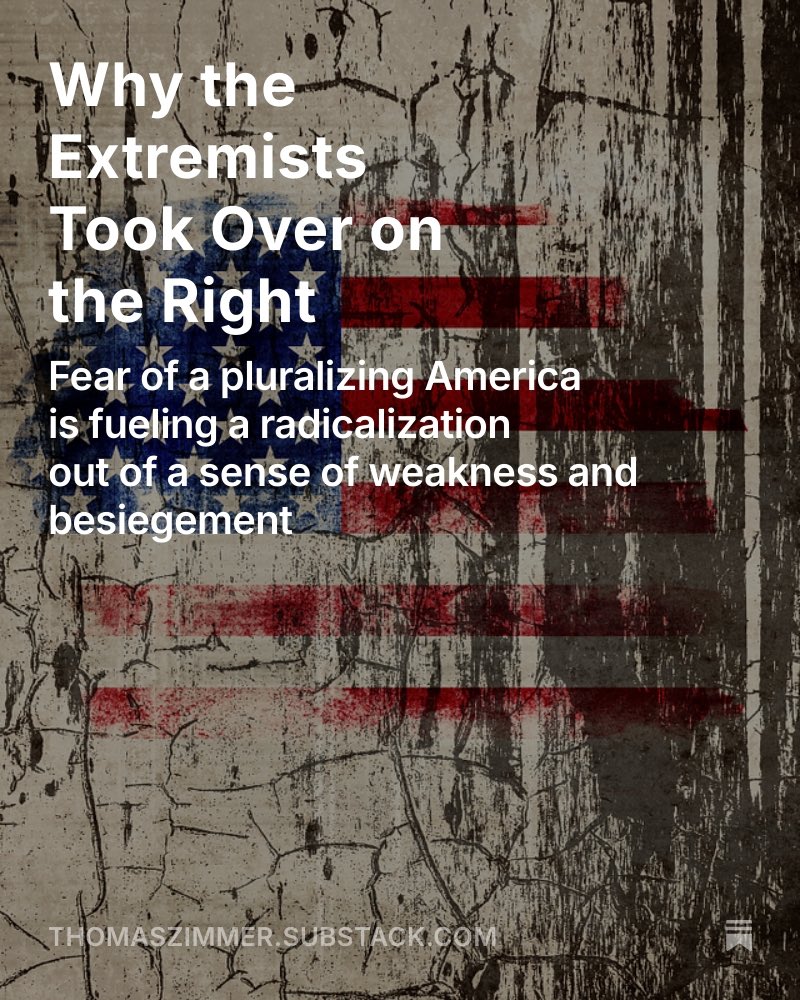This “argument” - basically: it can’t be fascism if it’s supported by more than just a few irrelevant fringe figures - is not only historically illiterate, but also indicative of how pervasive the dogma of white innocence is, how severely it distorts the discourse. 

The dogma of white innocence holds that whatever the political choices and actions of white Americans, they can’t be blamed, can’t be held responsible, that we must presume benign motives and reach for non-incriminating explanations.
There is a powerful incentive to sanitize the political choices of white conservative Christians: They are just “regular folks,” and as such, they can do no wrong. Usually, this is achieved by exculpatory tales about why they *didn’t mean to* or *had to* support extremism.
The “didn’t mean to” line of apologism often describes the extremists who gather significant white support as brilliant demagogues who managed to deceive and seduce innocent Americans. What chance did they have, encountering such evil genius?
The “had no choice but to support extremism” variant deflects blame by pretending white Americans have no political agency: Economic anxiety, anti-elite backlash, or just a reaction to liberals being mean – someone or something *made them do it*. How dare anyone judge them!
Whenever people rode waves of racial resentment to political prominence, their success has been described in such terms. Whether it was George Wallace’s surprisingly successful presidential run in 1968 or David Duke’s near-victory in the 1990 senate election in Louisiana.
This, here, is a slightly different variation of this sanitizing myth: White innocence is achieved not by justifying and apologizing widespread support for political extremism - but by decreeing that what they are supporting must not be called extremism in the first place. 

It’s an argument that doesn’t withstand the least bit of historical scrutiny and falls apart after even just half a minute of actually giving it some critical thought. Unless, of course, the sole purpose is to uphold and perpetuate white innocence. Then it’s very effective.
The only reason to pay any attention at all to this kind of nonsense is that this type of pseudo-reasoning is often used to obfuscate not just the nature of Trumpism, but also the depth and extent of Republican radicalization more generally.
If we’re not grappling honestly with the fact that Christian nationalism, white supremacist militancy, and fascistic extremism are “normal” - as in: widespread, beyond just the fringes - phenomena in American life, we’re complicit in helping these forces gain strength.
Fascists count on the idea that they can make “Don’t normalize this bad stuff” work in their favor, by relying on a perverse inversion: “If fascism isn’t normal, but these (white people) are normal / regular folks, then that means they can’t be fascists!” Let’s not fall for it.
A similarly apologist sleight of hand is often deployed to provide cover for the Republican Party: If extremism is not defined by its ideological/political substance, but as “something fringe,” then the minute it becomes GOP mainstream, it ceases to be regarded as extremism.
Just like that, not only do extremist ideas and policies get automatically legitimized - by definition, the Republican Party, regardless of how substantively extreme, also gets treated as “normal” simply because it ain’t fringe, because it’s supported by almost half the county.
One more thought: Something else that’s so revealingly problematic about this take is the deep-seated #exceptionalism it oozes. Basically: Maybe fascists can garner mass support elsewhere – but this is America, and how dare anyone suggest such things might happen here! 

I’ve seen a lot of people ask how someone with Hamid’s profile could possibly be unaware that fascistic movements have been quite popular in many countries. But if your perspective on America is shaped entirely by exceptionalist myths, who cares about other countries?
The idea that is still shaping so much of centrist and liberal thinking about the state of American democracy seems to be: “Sure, people in other countries have displayed fascistic tendencies, *but in America* no one beyond the irrelevant fringe would ever fall for that.”
Much of the Democratic elite and the elite centrist / liberal punditry still subscribes to an exceptionalist understanding that America is fundamentally good and inexorably on its way to overcoming whatever vestigial problems there might still be.
It builds on a mythical tale of America’s past, a distorted perspective on American history describing democracy as old, consolidated, and exceptionally stable, imagining the country and its people as basically immune to authoritarianism: It cannot happen here! 

Such a perspective completely ignores the fact that multiracial democracy started not even 60s years ago. Acknowledging what the GOP has become, and that millions of Americans are supporting the party not despite, but because of that, goes against the pillars of this worldview.
But the political system that was stable and consolidated for most of U.S. history was a white man’s democracy, or racial caste democracy – a restricted form of democracy that deliberately left a specific political, social, and economic order largely intact and untouched.
There is nothing old, stable, or consolidated about multiracial, pluralistic democracy in America. It only started less than 60 years ago, and the conflict over whether or not it should be allowed to endure and prosper has dominated politics ever since. It can happen here.
To a considerable degree, the fate of American democracy depends on whether or not the country’s political and civic elites are willing to adjust their expectations going forward and move beyond any residual notions of “It can’t happen here” exceptionalism.
Take the combined power of the myths of white innocence and American exceptionalism, and you’ll get such bizarre takes, delivered with equally bizarre confidence: It can’t be fascism if it’s supported by more than just a few irrelevant fringe figures – after all, this is America! 

The reason why more historical awareness won’t be sufficient as an antidote is that this kind of myth-making and myth-perpetuating serves a specific political purpose: Since there is nothing fundamentally wrong with the people or the institutions, no structural change is needed.
And just like that, the myths of white innocence and American exceptionalism conspire to provide the justification for upholding existing power structures in society as well as in the country’s political and civic institutions: Things are fine. Or they will be. Just keep going!
• • •
Missing some Tweet in this thread? You can try to
force a refresh






